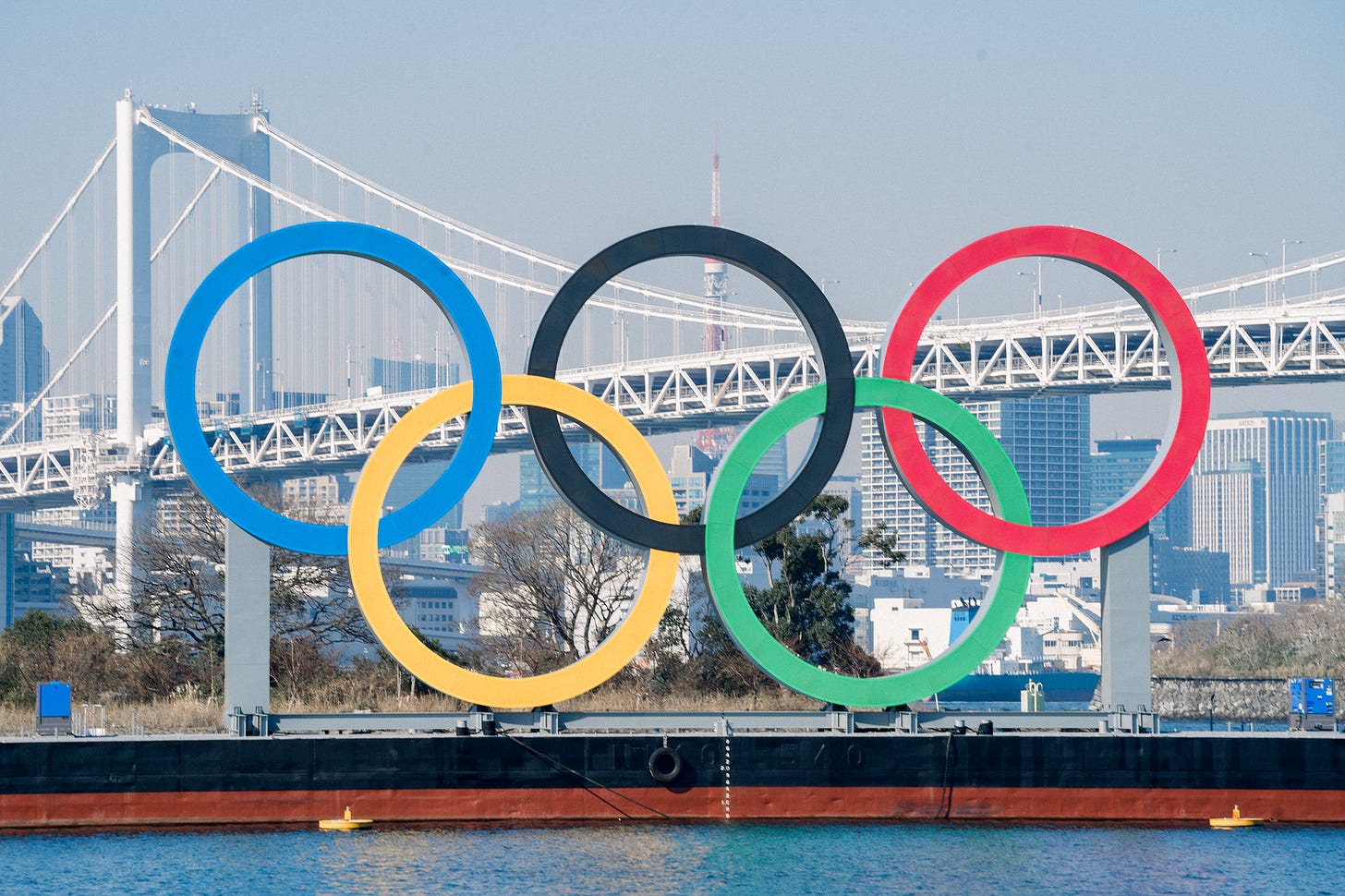There's way too much Olympic coverage, what do I really need to know so far?
Sports is political and should be examined as such, so we have you covered with everything from mental health to Japanese protests and more.
Hey there, and welcome to the 41st issue of The Supplement, a newsletter that fills in the gaps of your other news intake. This is Alex, one-third of The Supplement team!
Each week, we pick a question submitted by you, our readers. If you’d like to submit a question for a future week, then email us at thesupplementnewsletter@gmail.com or reach out to us on Twitter or Instagram.
If you like what you read each week, consider buying us a coffee ☕
This week, we’re tackling this question: There's way too much Olympic coverage, what do I really need to know so far?
TL;DR: The summer Olympics opened last week, and there’s already lots to cover — and we’re not just looking at sports. From Canadian women kicking ass to athletes prioritizing mental health to Japan making a big mess as it hosts, here’s a quick roundup of Tokyo 2020 so far. The big takeaway is: sports is political and should be examined as such.
Canadian women are kicking ass
As of July 28, Canada has 10 medals — two gold, three silver and five bronze — all won by women athletes. In particular, the gold medals are held by swimmer Maggie Mac Neil and weightlifter Maude Charron. Meanwhile, swimmer Penny Oleksiak has won two medals in Tokyo — enough to become Canada’s most decorated summer Olympian with six medals in total — and she still has a few more races to go.


Some view their success as not only a way to inspire more girls to participate in sports, but also as fuelling a need to provide more attention to and funding for women's sports.

Athletes are prioritizing mental health
Gymnast Simone Biles — widely regarded as the GOAT — has withdrawn from the team event and the individual all-around competition, citing a need to focus on her mental health. She also recalled having “the twisties” during her vault performance on Tuesday — a situation considered a gymnast’s worst nightmare because it causes them to lose control and could lead to serious injuries.
Given immense expectations for Biles to win gold, her decision has sparked much discourse. But it has largely garnered support and praise from fellow athletes for showing that they have “a say in [their] own health.”


Biles is also the last competing Olympian who is a survivor of sexual abuse — out of hundreds — by Larry Nassar, a former team doctor for USA Gymnastics. She cited wanting to use that status to make change as a major reason for participating in Tokyo 2020.
"Because I feel like if there weren't a remaining survivor in the sport, they would've just brushed it to the side,” she told TODAY.
Besides Biles, tennis player Naomi Osaka has also been vocal about mental health.
Japan is making a big mess
Despite the government placing Tokyo under a state of emergency and banning Olympic spectators in early July, the capital city is still seeing record COVID-19 spread and has become Japan’s top hot spot. At least 17 Olympians, and many more staff, have tested positive.
The country’s vaccine coverage is also still low. As of July 27, only 37.6 per cent of the Japanese population has received their first dose.
The Japanese public is pissed.
In fact, the vast majority of people in Japan thought that the Olympics should not have gone ahead in the lead up to Tokyo 2020. Thousands protested and are still protesting. The government’s approval rating hit a new low. And spending has ballooned to over $20 billion — nearly three times higher than the original forecast.
For many, this once again shows that hosting the Olympics is often a bad investment. There are also ongoing concerns about the displacement of low-income and homeless communities as well as the impact on the environment, amongst others.
More food for thought:
Tokyo 2020 has brought together the largest number of openly LBGTQ+ athletes in an Olympics: over 160! And many of them are winning. But more remains to be done to support them, including actions as simple as not misgendering non-binary or trans Olympians.
Sprinter Sha'Carri Richardson was barred from competing for smoking weed to cope with a family loss. Meanwhile, fencer Alen Hadzic made it to Tokyo 2020 despite facing sexual assault allegations. This is a good article that examines the vast double standard.
Clothes have also been a source of controversy. The Norwegian women’s beach handball team was fined after playing in shorts and not regulated bikinis. Meanwhile, the International Swimming Federation rejected swim caps designed to fit Afros, locs, extensions, and thick hair because they supposedly didn’t cover “the natural form of the head.” For a deeper analysis, read this thread by sports journalist Shireen Ahmed.
Obviously, there’s a lot more to cover, but we only have so many words. The big takeaway is sports is political and should be examined as such.
Here’s someone to follow:
This week, I recommend you follow Rob Csernyik, editor of the Great Canadian Longform — another curator for great stories! He also recently reported a super interesting story about bed bugs and the business around eradicating them for The Walrus that you should check out.
Here’s a story to check out:
I’m obsessed with this Buzzfeed deep dive on poppers’ origin story. Please read it!






Montreal is and should be the cautionary tale of what can and will
go wrong when a city bids on the Olympics - 46 years later the so-called big O is still the big owe for taxpayers who weren’t even born back then!